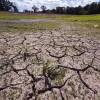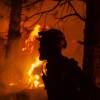As wildfires burned for the seventh straight day in the Breakheart Reservation in Saugus, firefighter Karyn Lothrop stood at the edge of Pearce Lake as a Blackhawk helicopter approached.
“He's coming in now,” she said.
The pilot hovered the Massachusetts National Guard helicopter over the lake, causing the water beneath it to blow around in a circle, then lowered to fill the 600-gallon bucket dangling from a rope below. As quickly as it could, the helicopter lifted back up with a full bucket. In just two minutes, it would return for more.
"This helicopter is working what we call the ‘ash fire’ at the moment,” said Lothrop, who works for the state's Department of Conservation and Recreation. “And it's got a real hot spot towards the center. It's a marsh, more [of a] wetland, that's been dried because of the drought. And so it's holding a lot of smoke and a lot of heat in ... like a heat sink."
Early on, there were five separate wildfires in the 650-acre Breakheart Reservation. Two of those fires have merged since the smoldering began Aug. 17, and a total of 80 acres have now burned. Trees are still standing, but large patches of the forest floor are black, with smoke rising in places. What sparked the fires is still under investigation.
This summer’s record-setting drought created the perfect conditions for wildfires in the state. On average, the state sees fewer than 50 wildfires the entire month of August. But already this month, the state has recorded 109 wildfires. Last August there were almost none.
"When it gets that dry, the things that don't normally burn, the actual green leaves — the live fuels, we call them — actually will carry the fire, where they don't do that most summers here,” said Alex Belote, the fire program coordinator with the state DCR.
WATCH: Record drought and record forest fires across Massachusetts
Belote said their goal is to keep the fire contained and limit smoke.
“To get it to a point where there's absolutely no more fire in it, it's really going to be dependent on the weather," he said. "And when we have an event like a week of rain, a tropical storm, that's what's really going to end the season, end the fire, and put it 100% out."
But that isn't expected to happen soon. The National Weather Service predicts similar conditions for the next two weeks: above average temperatures and below average rainfall.
Firefighters from around the state have been called in to contain the Breakheart Reservation wildfires.
As one of them shot a high-power hose directly into the charred soil, Joshua Nigro, district forest fire warden for Cape Cod, explained that just spraying a hose back and forth isn’t enough to extinguish a fire during a drought. This fire has burned deep into the root systems and could reignite at any time.
“[You need to] get in there to make sure that water penetrates into the ground, to be able to get into that, one or two feet into the ground,” he said.

Just a couple miles away, a wildfire that's burned more than 85 acres in Lynn Woods is still burning.
This week, the state announced a ban on all open flames and charcoal fires in state parks. A number of them have also been closed due to firefighting activity.
Firefighter Brian Everett, who has been working in Breakheart Reservation this week, said he usually spends August fighting fires in the Western United States. But not this year. He's helped fight six or seven wildfires here in Massachusetts in the last month.
"Mostly up on the North Shore here, but we've had some on the Cape where I'm from and Plymouth,” Everett said. “It's picked up big time around here."

As the Blackhawk helicopter flew by overhead with another load of water, firefighters took down a burned tree that was at risk of falling on its own, and got to work cutting up another downed tree that was blocking a roadway.
With wildfires, Belote said, there are always some years that are busier than others.
"But it seems like lately, it's getting busier and busier."
And with a changing climate leading to more droughts, he said, there's definitely a concern that this is what the future will look like.








